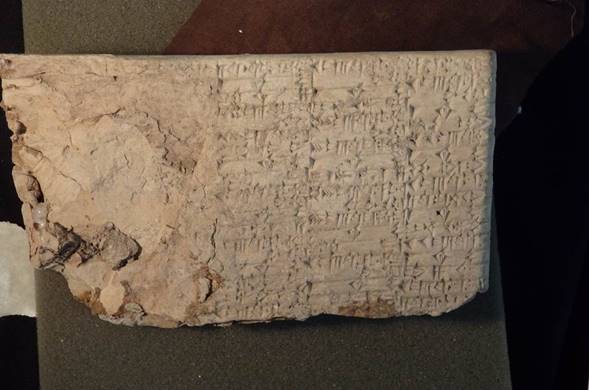One of the cuneiform tablets purchased by Hobby Lobby in 2010. Image: U.S. Attorney’s Office Eastern District of New York
Thousands of ancient Mesopotamian artifacts were smuggled by Hobby Lobby, the corporation behind a chain of arts and crafts stores, into the United States in 2011. Today, it was revealed that many of the items hailed from Irisagrig, a Sumerian city whose exact location has long-evaded historians.Hobby Lobby paid $1.6 million in 2010 for a cache of more than 5,500 artifacts, including clay cuneiform tablets (similar to writing slabs), clay bullae, and cylinder seals, which were falsely labeled as “tile samples.” The founder of Hobby Lobby, David Green, also owns the one of the world’s largest private collections—upward of 40,000 objects, though some of dubious authenticity—of biblical antiquities. He recently opened the Museum of the Bible in Washington, DC, where he intended to display the rare artifacts.“The tablets, primarily from the Ur III and Old Babylonian period (2100-1600 BCE), are mostly legal and administrative documents,” the U.S. Immigration and Customs Enforcement (ICE) said in a statement.Their provenance was theorized by Eckart Frahm, a professor of Assyriology at Yale University, who was asked by the Department of Homeland Security to survey the tablets in the fall of 2016.The collection also includes “an important collection of Early Dynastic incantations and a bilingual religious text from the Neo-Babylonian period.” Last year, Hobby Lobby agreed to return all of the items and pay an additional $3 million, according to the settlement of a civil complaint filed by New York federal prosecutors.Hobby Lobby was warned the objects may have been looted, specifically from archaeological sites in Iraq. The Islamic State, or ISIS, is known to have prolifically pillaged artifacts from Iraq and Syria, generating millions of dollars to fund its operations.Manuel Molina Martos, a research professor with the Spanish National Research Council, describes Irisagrig as “a Sumerian city never excavated before and whose location remains unknown,” noting that:
Last year, Hobby Lobby agreed to return all of the items and pay an additional $3 million, according to the settlement of a civil complaint filed by New York federal prosecutors.Hobby Lobby was warned the objects may have been looted, specifically from archaeological sites in Iraq. The Islamic State, or ISIS, is known to have prolifically pillaged artifacts from Iraq and Syria, generating millions of dollars to fund its operations.Manuel Molina Martos, a research professor with the Spanish National Research Council, describes Irisagrig as “a Sumerian city never excavated before and whose location remains unknown,” noting that:
Advertisement

Several thousand objects will be returned to Republic of Iraq this Wednesday at the Embassy of Iraq in Washington, DC.This story has been updated to include the name of Eckart Frahm who surveyed the tablets.The exact location of this site has been much debated, and regardless of which arguments we may find more convincing, the problem will only be definitively solved by means of surface surveys or regular archaeological excavations… Irisagrig is well documented in cuneiform sources from the third millennium beginning in Early Dynastic times.
